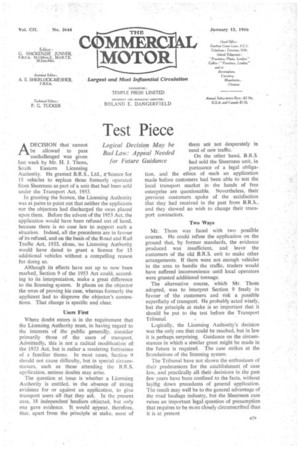Test Piece
Page 39

If you've noticed an error in this article please click here to report it so we can fix it.
ADECISION that cannot be allowed to pass unchallenged was given last week by Mr. H. I. Thorn; South Eastern Licensing Authority. He granted B.R.S., Ltd., alicence for 15 vehicles to replace those formerly operated from Sheerness as part of a unit that had been sold under the Transport Act, 1953.
In granting the licence, the Licensing Authority was at pains to point out that neither the applicants nor the objectors had discharged the onus placed upon them. Before the advent of the 1953 Act, the application would have been refused out of hand, because there is no case law to support such a situation. Indeed, all the precedents are in favour of its refusal, and on the basis of the Road and Rail Traffic Act, 1933, alone, no Licensing Authority would have dared to grant a licence for 15 additional vehicles without a compelling reason for doing so.
Although its effects have not up to now been marked, Section 9 of the 1953 Act could, according to its interpretation, make a great difference to the licensing system. It places on the objector the onus of proving his case, whereas formerly the applicant had to disprove the objector's contentions. That change is specific and clear.
Users First Where doubt enters is in the requirement that the Licensing Authority must, in having regard to the interests of the public generally, consider primarily those of the users of transport. Admittedly, this is not a radical modification of. the 1933 Act, but is rather a rendering fortissimo of a familiar theme. In most cases, Section 9 should not cause difficulty, but in special circumstances, such as those attending the B.R.S. application, serious doubts may arise.
The question at issue is whether a Licensing Authority is entitled, in the absence of strong evidence for or against an application, to give transport users all that they ask. In the present case, 18 independent hauliers objected, hut only one gave evidence. It would appear, therefore, that, apart from the principle at stake, most of them are not desperately in need of new traffic.
On the other hand, B.R.S. had sold the Sheerness unit, in pursuance of •a legal obligation, and the ethics of such an application made before customers had been able to test the local transport market in the hands of free enterprise are questionable. Nevertheless, their previous customers spoke of the satisfaction that they had received in the past from B.R.S., and they showed no wish to change their transport contractors.
Two Ways Mr. Thom was faced with two possible courses. He could refuse the application on the ground that, by former standards, the evidence produced was insufficient, and leave the customers of the old B.R.S. unit to make other arrangements. if there were not enough vehicles in the area to handle the traffic, traders would have suffered inconvenience until local operators were granted additional tonnage.
The alternative course, which Mr. Thom adopted, was to interpret Section 9 freely in favour of the customers and risk a possible superfluity of transport. He probably acted wisely, but the principle at stake is so important that it should be put to the test before the Transport Tribunal.
Logically, the Licensing Authority's decision was the only one that could be reached, but in law it is perhaps surprising. Guidance on the circumstances in which a similar grant might be made in the future is required. The case strikes at the foundations of the licensing system.
The Tribunal have not shown the enthusiasm of their predecessors for the establishment of case law, and practically all their decisions in the past few years have been confined to the facts, without layifig down precedents of general application.
The result may well be to the general advantage of the road haulage industry, but the Sheerness case raises an important legal question of presumption that requires to be more closely circurnScribeci than it is at present




























































































































